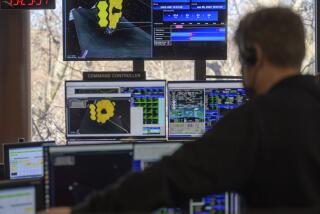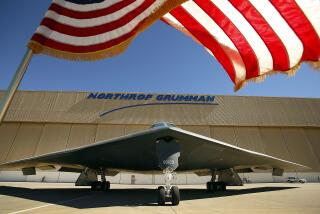Northrop to Cut Up to 3,000 Jobs by End of Year
- Share via
Northrop will cut its work force by 2,500 to 3,000 by year’s end, reflecting an effort to trim overhead expenses throughout the company and to reduce jobs in the massive B-2 stealth bomber program, the aerospace firm said Wednesday.
At least some of the Northrop workers will be laid off, though the company hopes that it can cut a majority of the jobs by normal attrition, Chairman Thomas V. Jones said at the firm’s annual shareholders meeting Wednesday. A majority of the job cuts will occur in the Los Angeles area, where some 77% of Northrop’s 44,000 workers are based.
For the record:
12:00 a.m. May 26, 1989 FOR THE RECORD
Los Angeles Times Friday May 26, 1989 Orange County Edition Business Part 4 Page 8 Column 3 Financial Desk 2 inches; 43 words Type of Material: Correction
A May 18 article said that Robert Niles, a commercial real estate agent, had estimated that a sale of Northrop Corp.’s buildings in Anaheim could bring $50 million to $70 million. Niles did not state those figures, which were a Times extrapolation based on estimates he provided of the value per square foot.
The company is facing a difficult time in many of its major military programs, ranging from technical problems that have forced delays to funding cutbacks that have slowed down production lines. Northrop expects its 1989 sales to remain little changed from last year’s $5.8 billion.
The Northrop job terminations are another signal that federal defense spending reductions and a drive to improve efficiency by contractors is inflicting a heavy economic toll, especially in the concentrated Southern California aerospace industry.
Virtually every major prime contractor is laying off workers from at least some of their divisions in the Los Angeles area, including General Dynamics, Hughes Aircraft, Litton Industries, Lockheed and TRW, among others.
Many in B-2 Program
Northrop has already cut back 2,300 jobs on the B-2 bomber at its Pico Rivera and Palmdale plants in the past two years, resulting from completion of development activities and a failure to obtain funding increases for production.
Although the company declined to break down where the new job cuts would occur by plant location, company spokesman Tony Cantafio said after the meeting that “a large number” of the job cutbacks would occur in the B-2 program.
Those layoffs were expected as development activities are completed, but recent federal budget cuts have robbed the program of funding increases that would have resulted in significant job growth. In addition, some of the B-2 layoffs will be tied to a cost reduction effort that Jones said is aiming to trim $3 billion from the cost of the B-2 program.
Despite those economy measures, the program has apparently undergone a significant cost growth. Recent estimates indicate that the bomber program will cost $74 billion for 132 airplanes, or about $570 million each.
Funding Slashed
Defense Secretary Dick Cheney last month cited technical problems on the bomber and budget constraints in a decision to postpone full-scale B-2 production by one year and slash funding by $1 billion in fiscal 1990.
In discussing the companywide effort to trim costs, Jones said: “We will be restructuring our corporate staff and reducing support organizations and staff in the operating units, as our programs move from development into production.”
The firm recently merged its electro-mechanical division in Anaheim with its electronics division in Hawthorne and transferred an initial 400 workers. The reorganization is widely expected to lead to an eventual closing of the facility, though Northrop spokesmen insisted that no decision has been reached yet.
“When any of our properties is not useful, we will sell it,” Jones said. “Certainly, Anaheim is one of those.”
John Simon, an aerospace analyst at Seidler Amdec Securities, said the layoffs are more “bad news” for the troubled firm. “Why do you lay off people unless you have too many people?” he asked. “Things are going mostly wrong at Northrop.”
Lawrence M. Harris, an analyst at Bateman Eichler, Hill Richards, added that uncertainties on major programs at Northrop have prompted him to take a “cautious view” and that he is not recommending purchase of Northrop shares.
At the shareholders meeting, held at a Los Angeles hotel, Jones delivered a 25-page speech, his final address to shareholders before he steps down, at the end of this year, after 30 years as chief executive.
In classic Jones style, he denounced government policies that have “severely strained the financial capacity of the industry.” He noted that Northrop is financing some $190 million of work on the Advanced Tactical Fighter because of a government funding shortfall.
Jones also took the opportunity to lash out at critics and promote a cheery “common vision” of the company’s strong points. In praising employee efforts on the B-2 program, he said, “Some people are willing to analyze and criticize in 10 seconds what it has taken 30,000 people 10 years to design and build.”
Jones did not specifically mention in his speech the company’s recent indictment on federal criminal charges, stemming from alleged falsification of testing on guidance parts for cruise missiles. He did say, “We intend to defend the company and our employees against unwarranted and frequently exaggerated charges.”
But a former corporate officer of Northrop, Welko Gasich, attended the meeting and rose to tell shareholders that he felt the company was not doing enough to defend the executives who have been implicated in the alleged wrongdoing.
“I have done nothing illegal and I don’t know anybody that has,” said Gasich, a former executive vice president who was closely involved in some of the company’s most significant technological programs.
Gasich left the firm seven months ago, as a federal grand jury investigation continued its probe into foreign payments that Northrop made in South Korea to help market its F-20 jet fighter. He has since been subpoenaed by a congressional committee investigating the Korean matter.
Jones side-stepped the question, saying that he couldn’t add anything to what Gasich had said. He said the company is in a “Super Bowl” and was being closely scrutinized.
It was evident at Wednesday’s shareholder meeting that the investigation has taken a toll on Gasich, who appeared tired and possibly under stress. Immediately after the meeting, Gasich said he was asking why Northrop was not making a stronger effort to defend its officers.
At a later press conference, when Jones was asked to respond directly to Gasich’s remarks that the company had not done enough to defend him, he said the company was paying for Gasich’s legal defense.
“There has been no allegation of criminality, as Welko has said,” Jones said. “When a grand jury investigates something like the Korea matter, it is wide-ranging.”
More to Read
Inside the business of entertainment
The Wide Shot brings you news, analysis and insights on everything from streaming wars to production — and what it all means for the future.
You may occasionally receive promotional content from the Los Angeles Times.











